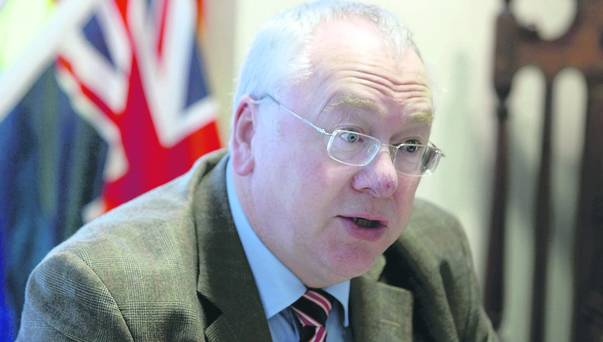
Una delle figure più importanti dell’Orange Order ha ammesso di incontrarsi regolarmente con i paramilitari lealisti e difeso la condivisione di piattaforme con i membri di gruppi terroristici.
Il Gran Cappellano orangista, Reverendo Mervyn Gibson, ha anche detto che potrebbe “vedere la logica” nella proposta del procuratore generale John Larkin per tirare una linea sul passato.
In un’intervista esclusiva, il reverendo Gibson ha respinto i commenti di Martin McGuinness che sostiene che Orange Order e UVF, insieme al Progressive Unionist Party (PUP) erano “diventati una cosa sola”.
Mervyn Gibson faceva parte della delegazione del DUP che ha partecipato ai colloqui presieduti dal diplomatico statunitense Richard Haass, organizzati per affrontare le preoccupazioni riguardanti le bandiere, le parate e il passato.
Nell’intervista il reverendo Gibson ha spiegato come ha lasciato la RUC (Royal Ulster Constabulary, la polizia nordirlandese riformata nel 2001) per il ministero pastorale e ha illustrato come il suo coinvolgimento nell’Orange Order gli aveva impedito di unirsi ai paramilitari lealisti al culmine del conflitto nordirlandese.
Ha anche confermato l’impegno dell’Orange Order nel continuare la lunga protesta in atto a North Belfast contro il divieto di concludere la parata del 12 luglio scorso da parte delle logge orangiste fermate a Twaddell Avenue.
E il ministro presbiteriano afferma di non avere alcun problema a condividere piattaforme comuni coi rappresentanti di organizzazioni proscritte.
“Non ho alcun problema con chi si impegna a una soluzione pacifica e a trovare soluzioni democratiche”, ha detto. “Non ho difficoltà a stargli accanto e a condividere una piattaforma basata su una causa comune.
“Viviamo in un paese dove i governanti erano proprio quelli che ci hanno fatto passare attraverso 30 o 40 anni di terrore.
“Dobbiamo accettarlo e ci dicono che è il diritto democratico. Trovo curioso quando le persone accusano gli unionisti di condividere un progetto con chiunque quando nel cuore di questo paese ci sono quelli che hanno provocato omicidi e caos”.
Lo scorso novembre il procutatore John Larkin aveva scatenato molte polemiche quando aveva suggerito che dovesse esserci un termine nelle prosecuzioni giudiziarie degli omicidi avvenuti durante i Troubles.
Ha detto che non ci dovrebbero essere ulteriori indagini della polizia o inchieste su eventuali uccisioni che hanno avuto luogo prima della firma dell’Accordo del Venerdì Santo nel 1998.
Più di 300 membri dell’Orange Order sono stati assassinati dai repubblicani durante i Troubles.
Per quanto riguarda le proposte controverse di John Larkin, il reverendo Mervyn Gibson ha detto di ritenere molto esigua la prospettiva di giustizia per molte famiglie.
Ha aggiunto: “Posso vedere la logica dietro la sua proposta. Ma non tiene conto delle opinioni di molte delle vittime.
“Mettere freddamente una riga sopra può sembrare razionale ma non soddisfa le esigenze delle vittime. Ci deve essere realismo sui pensieri della gente ma io ne comprendo i sentimenti”.
I’ll keep meeting terrorists: Orange chaplain Mervyn Gibson defends engaging with loyalist paramilitaries
One of the most senior figures in the Orange Order has admitted to regularly meeting with loyalist paramilitaries and defended sharing platforms with members of terror groups.
Grand chaplain Rev Mervyn Gibson also said he could “see the rationale” in proposals by the Attorney General John Larkin to draw a line under the past.
In an exclusive interview, Rev Gibson hit back at Deputy First Minister Martin McGuinness’ claims the Order and UVF, with the PUP, had become “one and the same thing”.
Rev Gibson was part of a DUP delegation which took part in all-party talks chaired by US diplomat Richard Haass aimed at addressing concerns around flags, parades and the past.
In the wide-ranging interview Rev Gibson told how he left the RUC for ministry and his belief his involvement in the Orange Order kept him from joining paramiliaries at the height of the Troubles.
He also affirmed the Orange Order’s commitment to continue protests over the long-running parading dispute in north Belfast.
And the Presbyterian minister said he had no issue with sharing platforms with representatives of proscribed organisations.
“I’ve no problem with anybody who is committed to a peaceful way forward and finding democratic solutions,” he said. “I’ve no difficulty standing beside them and sharing a platform, sharing the same cause.
“We live in a country where those in government were the very ones who put this country through 30 or 40 years of terror.
“We have to accept that and we’re told that’s the democratic right. I find it rich when people accuse unionist figures of standing on a platform with whoever when in the very government of this country are those who caused murder and mayhem.”
In November Mr Larkin sparked controversy when he suggested there should be an end to prosecutions for Troubles killings.
He said there should be no further police probes, inquests or inquiries into any relevant killings that took place before the Good Friday Agreement in 1998.
More than 300 members of the Orange Order were murdered by republicans during the Troubles.
Regarding Mr Larkin’s controversial proposals, Rev Gibson said he believed the prospect of justice for many families was very slim.
He added: “I can see the rationale behind his proposal. But it doesn’t take into account the views of many of the victims.
“Just to coldly draw a line under it, while it seems rational wouldn’t cater for the needs of victims. There has to be a realism about people’s thinking but I understand his sentiments.”